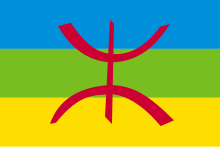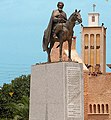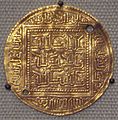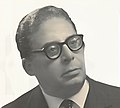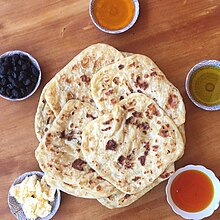 The Algeria PortalAlgeria, officially the People's Democratic Republic of Algeria, is a country in North Africa. Algeria is bordered to the northeast by Tunisia; to the east by Libya; to the southeast by Niger; to the southwest by Mali, Mauritania, and Western Sahara; to the west by Morocco; and to the north by the Mediterranean Sea. It is considered part of the Maghreb region of North Africa. It has a semi-arid climate, with most of the population living in the fertile north and the Sahara dominating the geography of the south. Algeria covers an area of 2,381,741 square kilometres (919,595 sq mi), making it the world's tenth largest nation by area, and the largest nation in Africa, more than 200 times as large as the continent's smallest country, The Gambia. With a population of 44 million, Algeria is the tenth-most populous country in Africa, and the 32nd-most populous country in the world. The capital and largest city is Algiers, located in the far north on the Mediterranean coast. The official languages of Algeria are Arabic and Tamazight. The majority of Algeria's population is Arab, practicing Islam. The native Algerian Arabic is the main spoken language. French also serves as an administrative and educational language in some contexts, but it has no official status. (Full article...) Selected article -Berbers (Arabic: بربر) or the Berber peoples, also called by their contemporary endonym Amazigh (/æməˈzɪɡ/) or Imazighen (Berber languages: ⵉⵎⴰⵣⵉⵖⵏ, ⵎⵣⵗⵏ, romanized: Imaziɣen; singular: Amaziɣ, ⴰⵎⴰⵣⵉⵖ, ⵎⵣⵗ; Arabic: أمازيغ), are a diverse grouping of distinct ethnic groups indigenous to North Africa who predate the arrival of Arabs in the Arab migrations to the Maghreb. Their main connections are identified by their usage of Berber languages, most of them mutually unintelligible, which are part of the Afroasiatic language family. They are indigenous to the Maghreb region of North Africa, where they live in scattered communities across parts of Morocco, Algeria, Libya, and to a lesser extent Tunisia, Mauritania, northern Mali and northern Niger. Smaller Berber communities are also found in Burkina Faso and Egypt's Siwa Oasis. Descended from Stone Age tribes of North Africa, accounts of the Imazighen were first mentioned in Ancient Egyptian writings. From about 2000 BCE, Berber languages spread westward from the Nile Valley across the northern Sahara into the Maghreb. A series of Berber peoples such as the Mauri, Masaesyli, Massyli, Musulamii, Gaetuli, and Garamantes gave rise to Berber kingdoms, such as Numidia and Mauretania. Other kingdoms appeared in late antiquity, such as Altava, Aurès, Ouarsenis, and Hodna. Berber kingdoms were eventually suppressed by the Arab conquests of the 7th and 8th centuries CE. This started a process of cultural and linguistic assimilation known as Arabization, which influenced the Berber population. Arabization involved the spread of Arabic language and Arab culture among the Berbers, leading to the adoption of Arabic as the primary language and conversion to Islam. Notably, the Arab migrations to the Maghreb from the 7th century to the 17th century accelerated this process. While local Arab dynasties came to rule parts of the Maghreb after the 7th century, Berber tribes remained powerful political forces and founded new ruling dynasties in the 10th and 11th centuries, such as the Zirids, Hammadids, various Zenata principalities in the western Maghreb, and several Taifa kingdoms in al-Andalus. Islam later provided the ideological stimulus for the rise of fresh Berber empires, the Almoravids and Almohads in the 11th to 13th centuries. Their Berber successors – the Marinids, the Zayyanids, and the Hafsids – continued to rule until the 16th century. From the 16th century onward, the process continued in the absence of Berber dynasties; in Morocco, they were replaced by Arabs claiming descent from the Islamic prophet Muhammad. (Full article...)General images -The following are images from various Algeria-related articles on Wikipedia.
Did you know
Selected biography -Albert Camus (/kæmˈuː/ kam-OO; French: [albɛʁ kamy] ⓘ; 7 November 1913 – 4 January 1960) was a French philosopher, author, dramatist, journalist, world federalist, and political activist. He was the recipient of the 1957 Nobel Prize in Literature at the age of 44, the second-youngest recipient in history. His works include The Stranger, The Plague, The Myth of Sisyphus, The Fall, and The Rebel. Camus was born in Algeria during the French colonization, to pied-noir parents. He spent his childhood in a poor neighbourhood and later studied philosophy at the University of Algiers. He was in Paris when the Germans invaded France during World War II in 1940. Camus tried to flee but finally joined the French Resistance where he served as editor-in-chief at Combat, an outlawed newspaper. After the war, he was a celebrity figure and gave many lectures around the world. He married twice but had many extramarital affairs. Camus was politically active; he was part of the left that opposed Joseph Stalin and the Soviet Union because of their totalitarianism. Camus was a moralist and leaned towards anarcho-syndicalism. He was part of many organisations seeking European integration. During the Algerian War (1954–1962), he kept a neutral stance, advocating a multicultural and pluralistic Algeria, a position that was rejected by most parties. (Full article...)
Selected cuisines, dishes and foods -
Msemmen (Arabic: مسمن msamman, musamman) or rghaif (رغايف), is a traditional flatbread originally from the Maghreb, commonly found in Algeria, Morocco, and Tunisia. It is folded into square pancakes with multiple internal layers and cooked on a griddle, usually served with honey or a cup of aromatic morning mint tea or coffee. M'semmen can also be stuffed with meat (khlea) or onion and tomatoes. The small msemmen pancakes are of Berber origin. (Full article...)
Related portalsWikiProjects
{{{contents}}}
CategoriesSelect [►] to view subcategories
Things you can do
New articlesThis list was generated from these rules. Questions and feedback are always welcome! The search is being run daily with the most recent ~14 days of results. Note: Some articles may not be relevant to this project. Rules | Match log | Results page (for watching) | Last updated: 2024-04-15 19:54 (UTC) Note: The list display can now be customized by each user. See List display personalization for details.
Algeria topics
Purge server cache
|

Sons of Union Veterans of the Civil War

